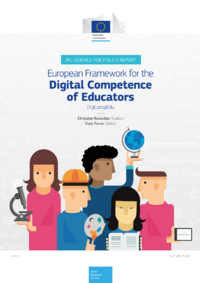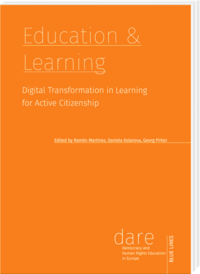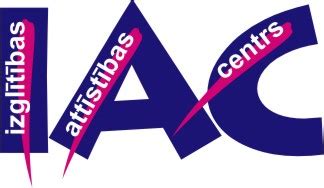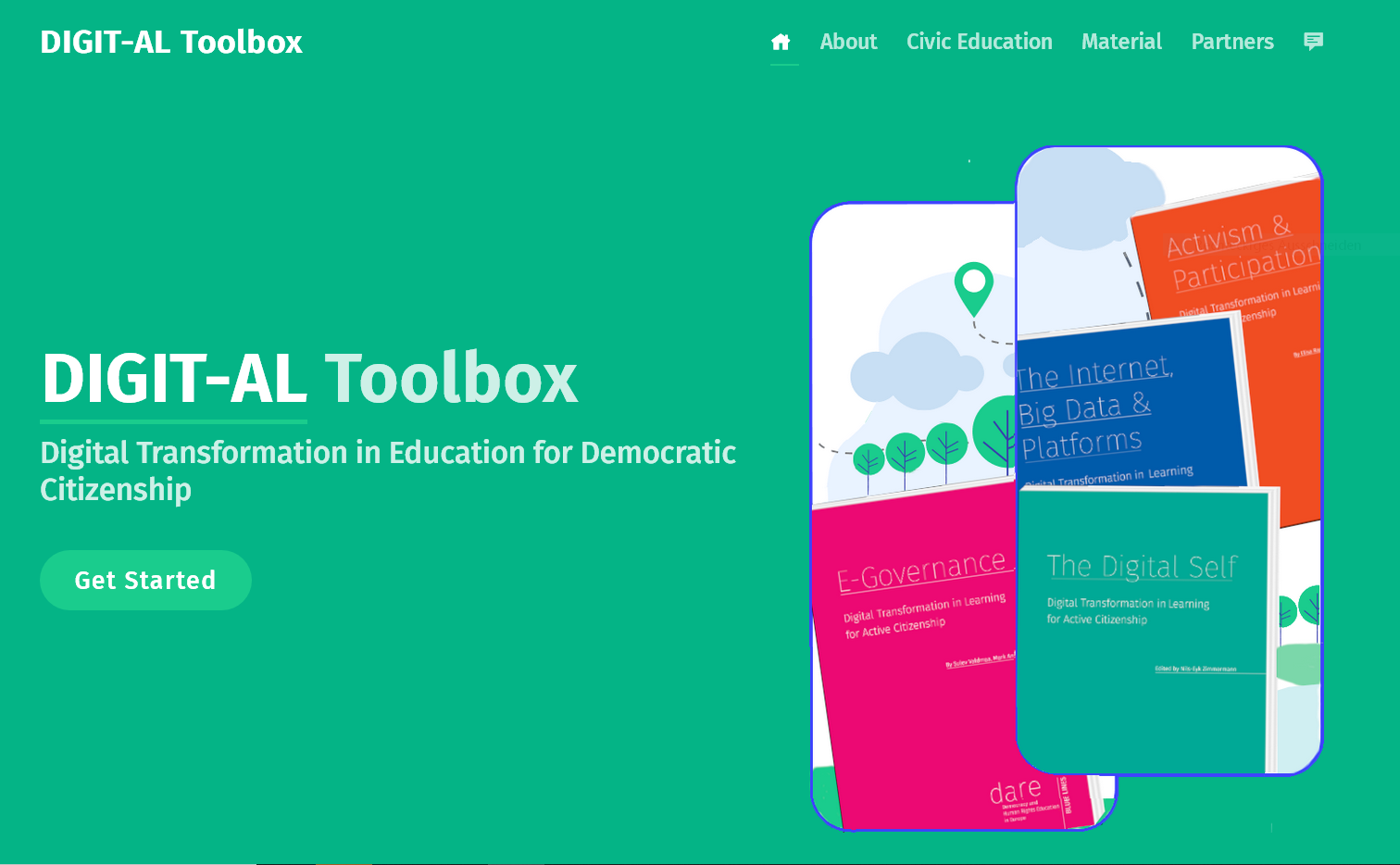The majority of European education systems have standards of teachers’ professional competence which include also the digital competence. The understanding about the content of educators’ digital competence in European countries differs, though not radically. The generally acknowledged framework documents, namely, the EU Digital competence standard for individuals, Digital competence standard for educators, UNESCO ICT standard for teachers, etc., have served as the basis for developing the national standards in the field of teachers’ digital competence. The analysis of the above-mentioned documents as well as the analysis of the national standards provide an insight into the most essential areas of teachers’ digital competence – digital pedagogy, digital resource management, digital competence for communication and cooperation, digital safety and digital identity management, as well as the digital competence for active citizenship.
Contents
Areas of teachers’ or educators’ digital competence
Digital pedagogy – the organisation of the teaching/learning process, giving the feedback, evaluation of the academic achievement with the help of ICT Digital resource management – selection, use and creation of the digital learning and methodological resources
Digital competence for communication and cooperation – communication via e-platforms, sharing resources, joint online work with all the participants of the education process (colleagues, pupils, parents, experts, authorities)
Digital identity management and digital safety – responsible behaviour on-line, data protection and privacy, the use of ICT for creating a professional image, the environmentally and health-friendly use of digital tools
Digital competence for active citizenship – the use of digital gadgets and applications for influencing social processes, the awareness of equality and inclusion issues in the context of technologies
An adult learner is someone who has an independent self-concept and who can direct his or her own learning, has accumulated a reservoir of life experiences that is a rich resource for learning, has learning needs closely related to changing social roles, is problem-centred and interested in immediate application of knowledge, and is motivated to learn by internal rather than external factors (Gregson & Sturko, 2007). These features, on the whole, can be attributed to the teacher or educator as an adult learner. However, it should be admitted that the context of the digital competence also has its specifics. The previous life experience as a rich learning resource can be used indirectly and on a limited scale. The issue about the learning motivation is a complex one. Both the internal and external motivation are present in the area of the digital competence. The internal motivation defines the teachers’ willingness to follow the modern professional development trends, including the improvement of the digital competence. The external pressure activates the external motivation in particular cases. For instance, the external motivation is activated at present when, due to the coronavirus crisis, teachers are unable to perform their professional duties because they lack a certain level of the digital competence.
Digital transformation is not about technology.
Or at least not only about technology. It is more about the transformation of mindsets of those involved and changes in the organisational culture. Reflecting about educators and teachers in the transformation situation, digital competence becomes itself a tool for competence development, since it relates to vast dimensions of education and life. The same wider contextual position applies to the role of teachers in the digital age – it includes not only the capacity to be digitally competent themselves but also the ability to support learners/pupils as knowledgeable and responsible citizens in the age of digital transformation and ethical responsibility.
Evidence suggests that the majority of teachers or educators have sufficient skills to use technologies. Besides, both the scope of skills and the number of advanced users continues increasing. However, there is not sufficient deep knowledge about the didactic strategies and methods of teaching in the work with digital means.
Systemic agreement and support
There are two factors exerting a decisive impact on the key of success of digital transformation – educator’s internal factors and systemic changes in the stakeholders’ collaboration models. Digital transformation in education thus should orient on a causal chain: first, the society’s consensus about what the aims of education are, second decisions made by professionals concerning the pedagogical means with the help of which to achieve these aims and, integrating the logic of a lifelong learning approach covering vast areas of education and learning. Last and only then, the solutions as to how technologies can support pedagogy.
Learning about costs and benefits
The introduction of the remote (distance) learning has exerted a radical and fundamental impact on teachers’ “level of digitalisation”. A costs–benefits analysis emphasises both positive impacts of the remote (distance) learning caused by the coronavirus crisis, for instance - applying digital tools, creative interdisciplinary solutions and cooperation between the state and private sector. However, these costs are high: there have been issues of accessibility in the case of learners/ families/groups at risk, of special needs’ learners as well as in the physical and emotional health of teachers, pupils and parents, as these emerge and are not sufficiently recovering from the challenges posed by Covid 19.The results of the Research-based Analysis and Monitoring of European Youth Programmes (RAY network) on “Youth Work and the Corona Pandemic in Europe” states the loss of the most vulnerable target groups as one of the biggest effects of the pandemic in European Youth Work (Böhler et al., 2020).
DigCompEdu Digital Competence for Educators
The DigCompEdu framework is directed towards educators at all levels of education, from early childhood to higher and adult education, including general and vocational training, special needs education, and non-formal learning contexts.
Redecker, C. (2017). European Framework for the Digital Competence of Educators: DigCompEdu. Punie, Y. (ed). EUR 28775 EN. Publications Office of the European Union, Luxembourg, 2017, ISBN 978-92-79-73494-6, https://doi.org/10.2760/159770, JRC107
Ingūna Irbīte
Project coordinator, trainer, author of educational programmes and materials, as well as a practicing teacher. The Educational Development Centre in Riga is the leading non-profit nongovernmental organisation in Latvia in the field of professional development.
References
Böhler J, Karsten A., Pitschmann A. in: Research-based Analysis of European Youth Programmes: Youthwork and the Corona Pandemic in Europe. RAY network - Research-based Analysis of European Youth Programmes (RAY), Policy Brief.
Gregson J.A., Sturko P.A. (2007). Teachers as Adult Learners: Re-conceptualising Professional Development. MPAEA Journal of Adult Education, XXXVI (1).
Redecker, C. (2017). European Framework for the Digital Competence of Educators: DigCompEdu. Punie, Y. (ed). EUR 28775 EN. Publications Office of the European Union, Luxembourg, 2017, ISBN 978-92-79-73494-6, https://doi.org/10.2760/159770, JRC107
Education and Learning
This text was published in the frame of the project DIGIT-AL - Digital Transformation Adult Learning for Active Citizenship.
Pirker, G. and Martínez, R. (Ed.): Education and Learning (2020). Part of the reader: Smart City, Smart Teaching: Understanding Digital Transformation in Teaching and Learning. DARE Blue Lines, Democracy and Human Rights Education in Europe, Brussels 2020.









